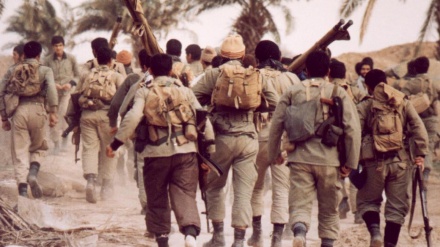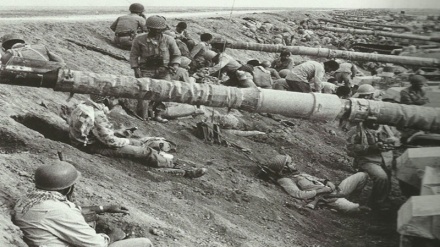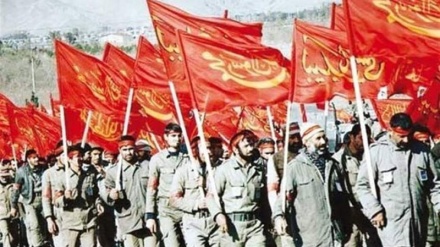Glimpses of Epic of 8-Year Holy Defense (48)
After Operation Ramadan in the second year of the imposed war, the Islamic Republic of Iran came to the conclusion that as the Ba'athist army has changed its defence tactics, Iran also needed to create some changes in its tactics and defence lines to thwart the enemy's scheme and remove the pressure of the Iraqi army.
Unlike Saddam's Ba'athist regime, the Islamic Republic faced huge sanctions for its access to a variety of light weapons and military equipment. To overcome these conditions and further organize military units, it was required that the battle scenes did not remain in a state of stagnation and that the Ba'athist enemy should have been involved in various fronts. In view of this, the launching of small-scale operations was put on the agenda to pave the ground for broad and major operations. The Operation Moslim ibn Aqil on the mountainous areas of western Iran- just 100 kilometers away from Baghdad- was the first small-scale operation which took place in October 1982. The details of the operation were discussed in the previous program.
Victory in Operation Moslem ibn Aqil showed the resilience of the Iranian forces to change the battlefield from the flat deserts of the south to the mountainous terrain of the west. The success of this operation led the Iraqi Ba'athist regime to a state of frenzy. The elements affiliated to and paid by Saddam's regime exploded a car laden with 150 k of explosives on September 23, 1982, in front of a five-storey building at Imam Khomeini Square of Tehran. Dozens of people were martyred and hundreds were injured as a result of this terrorist act.
Founder of the Islamic Republic of Iran, Imam Khomeini, said in a message in the wake of this terrorist incident, "Our dear people see that whenever they gain victory and the brave combatants of Iran defeat the enemies of Islam and nations and push them back, the enemies, with the motive of revenge to relieve them of their complexes, plunge a group of innocent people in blood; and in their false assumption, they want to create shakiness among the brave combatants. They do not know the power of Islam and faith and they evaluate the Islamic nation with their animalistic and western motives.”
At that time, the MKO terrorist outfit officially became a flunkey of the Ba'athist regime and its masters in Washington and Tel Aviv and operated as the fifth column of Saddam's regime. After the Operation Moslim ibn Aqil, through their secret agents in the air force and with the coordination of the Ba'athist regime, the MKO terrorists kidnapped a C-130 aircraft and took it to one of the Persian Gulf Sheikhdoms. They also continued their assassinations.
Ten days after the hijacking the Iranian aircraft, the MKO terrorists, in a grenade attack martyred Ayatollah Ata'ollah Ashrafi Esfahani, Friday prayer leader of Kermanshah. He was one of the ulema who had great popularity and influence among the people.
The attempt by MKO terrorists was to take the consistency and solidarity of the Iranian people via assassination of popular and influential figures, especially Friday prayer leaders. Ayatollah Ashrafi Esfahani, in spite of old age, was effective in revival of fresh morale among the brave combatants at battlefronts. Imam Khomeini, in a message on the occasion of the martyrdom of this popular clergyman, said: “On the front of defending the truth, he was among those who would encourage the combatant youths. His martyrdom caused the clergy community to mourn.”
After the Operation Moslim ibn Aqil, the regime of Saddam began new moves to totally change the realities on the ground and depict Iran as a warmonger. Hours after launching Operation Muslim ibn Aqil, Iraq began its political and propaganda campaign in a hasty move. On the first day, Iraqi Foreign Minister Saadoun Hamadi met with the heads of the delegations of the five members of Security Council (China, the Soviet Union, France, Britain and the US) separately. Discussing what the Iraqi regime called "the dangers of continued operations by Iran", the Iraqi foreign minister called for an extraordinary session of the Security Council and the UN body's stance on Iran's entering the Iraqi soil.
The BBC considered these Iraqi moves as a political exploitation of the status quo, saying, "It seems that Iraq's request from the UN has not been so much to help it on the rainy day, but the efforts made by Iraq to take political concession from Iran's offensive. Saddam feels very well that he can take a positive outcome from the resolution of Fez Conference. Recently, he said that he had been assured at the Fez Conference that if Iran's forces crossed the Iraqi borders, Arab states would help Iraq militarily, economically and politically."
The Iraqi permanent representative to the UN also called on the UN Security Council periodical chairman to convene an extraordinary session to discuss the Iraq-Iran war. A few hours later, AFP announced that the Jordanian envoy to the UN, as the UNSC chairman, had agreed with the Iraqi delegation's plea and urged the Iraqi deputy to provide a report for the information of the permanent and periodical members of the Security Council.
Three days after offering the Iraqi plea, the UN Security Council held a session. Moroccan Foreign Minister, Mohamed Bosta, spoke on behalf of Arab regimes. Supporting Iraq and calling it a peace-seeking country, he called for the continuation of the so-called peace delegations' work and what he described as "Iran’s cooperation with them". Iraqi Foreign Minister Saadoun Hamadi, who had taken part at the session instead of the Iraqi permanent representative to the UN, called on the Security Council to take more effective decisions on Iran. Having heard the remarks of delegates, the UNSC began voting and adopted Resolution 522, which had been drafted by the Jordanian delegate as the head of the Security Council.
Resolution 522 was set up in seven articles, regardless of recognition of the aggressor and compensation for the damage inflicted on Iran. In this resolution, the Security Council welcomed Iraq's stance in accepting the previous resolution (resolution 514) calling for the resumption of the activity of international mediators. Rajaee Khorasani, Iran's permanent UN representative, said in a statement that Iran's condition for participating at UNSC sessions and further cooperation with the organ was to condemn the aggressor, pay compensation to Iran and returning the persons exiled from Iran to Iraq. In an interview, enumerating several instances of overlooking by the UN on Iraq's aggression against Iran, the Iranian diplomat indicated that Iran's military operation was to expel the invader. Thus, he protested against the resolution, stating that the Security Council had failed to fulfill its obligations explicitly clarified in the UN Charter. He added that when Iraq invaded Iran and occupied 20 cities and 1,200 villages in Iran, and Iraqi soldiers attacked residential buildings, schools, hospitals, mosques, and displaced 2 million Iranians, the Security Council never acted against the invading country and remained silent.
Imam Khomeini, in response to these political movements and peaceful claims of the regime of Saddam, said during a speech, "We accept peace; we welcome peace, but a noble Islamic peace, a peace in which it is determined what the aggressor has done, a peace that should compensate for the country's losses; not a peace that is said on one side while sending artilleries to shoot at innocent people".
The Imam also wrote in response to the congratulatory message of the President of Guinea on the occasion of the Eid al-Adha: "We have repeatedly declared that we demand the end of war and seek a peaceful endeavor to punish the aggressor and pay the war damage, and that all innocent people who have been displaced from home and life must return to their cities.”
FK/RM/ME


